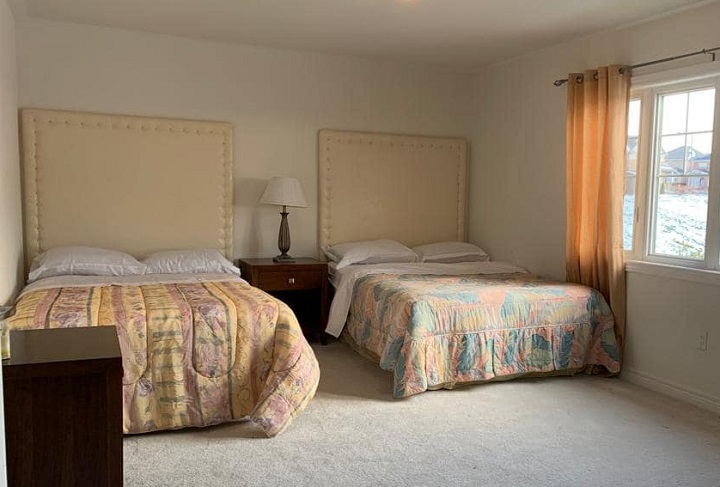The founder of an Ontario transitional housing program for women of colour has launched a crowdfunding campaign to expand her home and to help maintain vital services amid the ongoing coronavirus pandemic.

Lisa Ogbole founded Imani’s Place, a transitional home in Alliston that provides services for women from across Ontario, more than a decade after experiencing years of physical and emotional abuse from her former partner.
“I thought my life was coming to an end because when you have a partner, this is somebody that you trust right?” she told Global News.
“It’s not as easy as I’m saying it. There were long nights of crying myself to bed.”
Ogbole said she promised herself after leaving in 2006 that she would create a space for women who have survived domestic violence in order for them to heal and to get services.
However, what sets her organization apart is its commitment to primarily support Black, Indigenous and People of Colour (BIPOC).
“My goal is to remove 250 Black women from the social service system by 2025,” she said.
- Ford government to table legislation to restrict bike lanes on city streets
- How a group of Toronto tenants turned to a risky last resort and got a ‘huge victory’
- Ontario courts are stretched to their limits. Will a new minister of bail reform help?
- Simply Delicious Recipe: Decadent snack using Ontario apples
In 2019, Ogbole was able to establish a home with six beds (there are plans to add two more beds). But she has spent a longer period of time building a network of contacts in an effort to serve the BIPOC community.
Ogbole, who is originally from Nigeria, said there is a major need to provide culturally appropriate supports to members of the BIPOC community.

Get daily National news
“The way you deal with people from Kenya is different from the way you deal with people from Zimbabwe because we all have our different cultures,” she said.
“We try not to overstep people’s boundaries. We understand what their culture is and then we deal with it that way.”
Ogbole recalled a woman originally from Ethiopia who was trying to escape domestic violence at home. She said the woman spoke Oromo — a language spoken in Ethiopia — but noted when it came to getting a translator through a government-funded agency, it wasn’t possible.
“I had to dig into my network as a Black person … to be able to find someone who speaks Oromo to be able to assist this lady,” she said.
Ogbole also highlighted instances of systemic racism within the existing shelter and transitional housing network. She said there are many instances where there are misconceptions about Black women. Ogbole recalled a situation with a woman who was a human trafficking victim who attempted to escape through an organization in Orangeville.
“She said she would be left at the table alone to eat … No one was interacting with her,” Ogbole said.
“She picked up her bags and went right back to the sex industry because that’s all she knows.”
However a year after opening her doors, Ogbole said the coronavirus pandemic has made it very difficult to operate — highlighting an increased need and a dwindling base of support.
“Domestic abuse since COVID has increased by 25 per cent,” she said.
“We work a lot with volunteers. Before COVID we had the volunteers willing to work, but once COVID started, because of social distancing a lot of them couldn’t continue.”
Ogbole said before the pandemic, her organization was able to occasionally access services such as counselling on a volunteer basis. But now she said she needs to pay to ensure women staying at the home can continue to access things like counselling and transportation.
Ogbole cited an example where a woman who is pregnant and staying at the home needs to spend about $200 in order to get to a downtown Toronto hospital to see her OBGYN.
In order to help address the growing list of needs, Ogbole launched a crowdfunding campaign called the Black women safety matters fund with a goal of raising $100,000.
But for Ogbole and Imani’s Place, the needs aren’t just financial. She said they need appliances such as a deep freezer to hold food, a new washer and dryer, computers to access online classes and for children to keep up with school work, personal hygiene items and food.
“I think we’ll impact our community and help women to truly become who they are supposed to be,” she said.












Comments